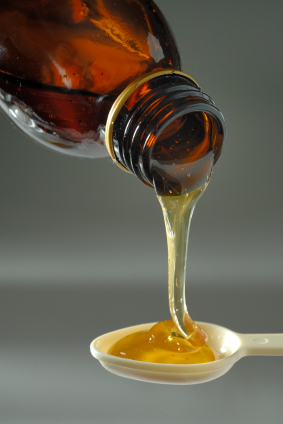Cough Syrup Manufacturer Suffers Bad-Tasting Appellate Defeat

When Yu-Hsing Tu worked at pharmaceutical company UCB Manufacturing, he signed a strict confidentiality agreement. In the agreement, Tu promised that he would never disclose any of UCB's “secret or confidential information,” including a laundry list of items such as “designs, formulas, processes, . . . techniques, know how, improvements, [and] inventions.” Tu's work was important to UCB: he helped formulate its cough syrup products, including Delsym, and had significant knowledge of its “Pennkinetic system” for controlled release of cough medication in liquid form.
In 2001, Tu left UCB and started working for his friend Ketan Mehta at Tris Pharma. Soon after, Tu and Tris Pharma began formulating generic versions of UCB’s cough syrups. Six years later, Tris's competitive products were on the market, and UCB lost a lot of market share.
UCB immediately went to court and sued Tu and Tris for misappropriation of trade secrets, breach of contract, and unfair competition. It asked for a preliminary injunction -- a court order early in the lawsuit that would require Tris to stop using its trade secrets until the merits were finally decided. After a five-day hearing focused on the misappropriation claim, the trial judge denied the injunction, maintaining the status quo for Tris.
Shortly after that win, Tu and Tris took the offensive in the litigation, moving for summary judgment. At that point, UCB made a decision that would end up costing it later on: it voluntarily gave up its claim for misappropriation of trade secrets. The trial court then granted Tu and Tris’s motion for summary judgment on the other claims, relying on its finding during the preliminary injunction phase that Tu and Mehta were credible when they testified that they didn’t misuse UCB’s confidential info. UCB appealed.
For experienced litigators, at least one part of the New Jersey Appellate Division's late-August ruling was unsurprising. UCB challenged the trial court's order on the ground that the trial judge shouldn’t have relied on his credibility findings in deciding the summary judgment motions, and the appellate court agreed. This is textbook civil procedure law: a judge doesn’t weigh testimony and make inferences about whether witnesses are believable at summary judgment. That’s the jury’s role.
But despite getting a favorable ruling on this point, UCB lost the case anyway, on the ground that “as purely a question of law, [UCB]’s confidentiality agreement is not enforceable under New York law for the purposes [UCB] seeks to enforce it.” UCB Manufacturing, Inc. v. Tris Pharma, Inc., Dkt. No. A-5095-10T2, 2013 WL 4516012 (N.J. App. Div. Aug. 27, 2013).
In reaching this result, the court started from the first principle that under New York law – which applied to the interpretation of the agreement, even though the case was brought in New Jersey – “courts disfavor post-employment anti-competitive covenants restricting a former employee’s ability to seek future employment.” New York courts do permit restrictive covenants that are necessary to prevent the disclosure or use of trade secrets, which have been defined as a “device, formula, or manufacturing process which is used in one’s business, and which gives him an opportunity to obtain an advantage over competitors who do not know or use it.” They also have allowed restrictive confidentiality covenants where an employee’s work is truly special, unique, or extraordinary.
Unfortunately for UCB, it couldn't fit its agreement with Tu into these categories. Instead, Tu and Tris used the fact that UCB had dropped its claim of trade secret misappropriation to their benefit, arguing that UCB didn't even believe that the information Tu had used was a trade secret. The court agreed with this principle, and with the broader concept that an employee cannot be restrained from “using general techniques learned during his or her employment,” even when trade secrets are implicated. It also found that Tu wasn’t so unique that he couldn’t be replaced – he didn’t invent the Pennkinetic process, he was consulted mostly as a trouble-shooter, and the cough syrup he helped formulate was still manufactured after he left. Therefore, said the court, UCB had no “legitimate business interest” in protecting the information in his possession.
The appellate court also didn’t like the fact that the confidentiality provision was “not limited in terms of time, space, or scope.” It read the agreement as prohibiting Tu from making disclosures during his entire career. This would be “unreasonably burdensome” to him, it wrote, and it would also contradict the public policy in favor of allowing employees to use their skills and knowledge for new employment.
Therefore, even though UCB’s broad confidentiality agreement would arguably have swept in Tu’s knowledge, the court simply decided not to enforce the agreement. Tough medicine, but UCB will have to swallow it. At least until the next appeal.
Information provided on InsightZS should not be considered legal advice and expressed views are those of the authors alone. Readers should seek specific legal guidance before acting in any particular circumstance.
As the regulatory and business environments in which our clients operate grow increasingly complex, we identify and offer perspectives on significant legal developments affecting businesses, organizations, and individuals. Each post aims to address timely issues and trends by evaluating impactful decisions, sharing observations of key enforcement changes, or distilling best practices drawn from experience. InsightZS also features personal interest pieces about the impact of our legal work in our communities and about associate life at Zuckerman Spaeder.
Information provided on InsightZS should not be considered legal advice and expressed views are those of the authors alone. Readers should seek specific legal guidance before acting in any particular circumstance.




